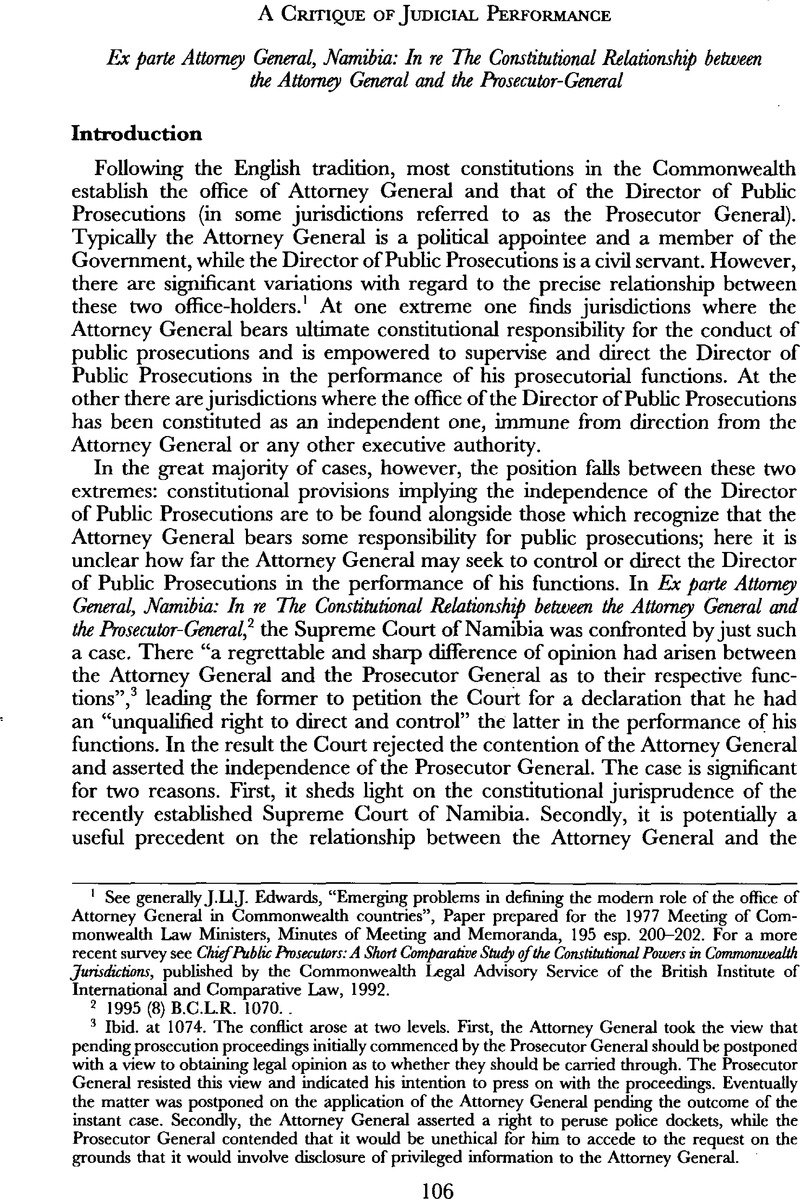No CrossRef data available.
Published online by Cambridge University Press: 28 July 2009

1 See generally Edwards, J.Ll.J., “Emerging problems in defining the modern role of the office of Attorney General in Commonwealth countries”, Paper prepared for the 1977 Meeting of Commonwealth Law Ministers, Minutes of Meeting and Memoranda, 195 esp. 200–202.Google Scholar For a more recent survey see Chief Public Prosecutors: A Short Comparative Study of the Constitutional Powers in Commonwealth Jurisdictions, published by the Commonwealth Legal Advisory Service of the British Institute of International and Comparative Law, 1992.
2 1995 (8) B.C.L.R. 1070.Google Scholar
3 Ibid. at 1074. The conflict arose at two levels. First, the Attorney General took the view that pending prosecution proceedings initially commenced by the Prosecutor General should be postponed with a view to obtaining legal opinion as to whether they should be carried through. The Prosecutor General resisted this view and indicated his intention to press on with the proceedings. Eventually the matter was postponed on the application of the Attorney General pending the outcome of the instant case. Secondly, the Attorney General asserted a right to peruse police dockets, while the Prosecutor General contended that it would be unethical for him to accede to the request on the grounds that it would involve disclosure of privileged information to the Attorney General.
4 Art. 32(4)(cc).
5 Minister of Defence, Namibia v. Mwandinghi 1992 (2) SA 355.Google Scholar
6 Op. cit. n. 2 at 1079.
7 Ibid. at 1080.
8 Ibid.
9 Ibid. at 1086.
10 Ibid. at 1085.
11 Ibid. at 1089.
12 Ibid. at 1088.
13 Ibid. at 1080.
14 On this point see Bennion, F., Statute Law, London, 1990, 249.Google Scholar
15 On this topic see Turpin, C., British Government and the Constitution (2nd ed.), London, 1990, 75–76, 421–422Google Scholar; and Marshall, G., Constitutional Conventions, Oxford, 1984, 77–78.Google Scholar
16 Gouriet v. Attorney General [1978] A.C. 435, per Lord Fraser of Tullybelton at 523. Also see State (McCormack) v. Curran 1987 I.L.R.M. 225 per Finlay, C.J., at 237.Google Scholar
17 The Office of Director of Public Prosecutions in Ireland is constituted as an independent one, yet the courts have recognized that in certain circumstances the Director is bound to provide reasons where he declines to institute criminal proceedings. See Heron v. DPP unreported (26 July, 1993), cited in Hogan, G. and Whyte, G., The Irish Constitution, 309.Google Scholar
18 Art. 18.
19 Edwards, J.Ll., Ministerial Responsibility for National Security, Ottawa, 1980 at 69–70.Google Scholar
20 See MrAyoola, Justice in a Keynote address on “Decisions to Prosecute” at the First Conference of Commonwealth Directors of Public Prosecutions (Commonwealth Law Bulletin, 1991, 1037–1137.Google Scholar
21 Edwards, , op. cit., 57.Google Scholar
22 E.g. Republic of Ireland, s. 5(1) of the Prosecution of Offences Act, 1974; and s. 79(a) of the Barbados Constitution.
23 Indeed, prior to seeking judicial relief in the instant case, the Attorney General had reported the Prosecutor General to the Judicial Services Commission on the grounds that the latter was guilty of “insubordination”. In its response, the Commission took the view that the complaint was unjustified because the Prosecutor General had at all material times bona fide believed that he was constitutionally entitled to refuse to take instructions from the Attorney General.
24 H v. Director of Public Prosecutions (1994) 2 I.L.R.M. 285, 290.Google Scholar
25 See for example Hilson, C., “Discretion to prosecute and judicial review”, [1993] Crim. L. Rev. 739Google Scholar; R v. Chief Constable of Kent ex parte L. [1993] 1 All E.R. 772 (England)Google Scholar; H v. Director of Public Prosecutions; Winn v. Canada 1994 (unreported) (Canada).
26 See Gouriet v. Attorney General [1978] A.C. 435, and more recently R v. Solicitor General ex parte Taylor [1995] (unreported) and the cases cited therein.
27 Ibid. at 1089.
28 On this point see SirHetherington, Thomas, Prosecution and the Public Interest, London, 1989, ch. 1.Google Scholar
29 It should be noted that the necessary reforms could be introduced without the need to take the drastic, and admittedly difficult, step of amending the Constitution. Art. 87(d) provides that it “shall be the duty of the Attorney General to perform all such functions as may be assigned to the Attorney General by Act of Parliament”. Accordingly, it is open to Parliament to enact legislation specifically providing that the Attorney General shall exercise supervisory responsibilities over the Prosecutor General.